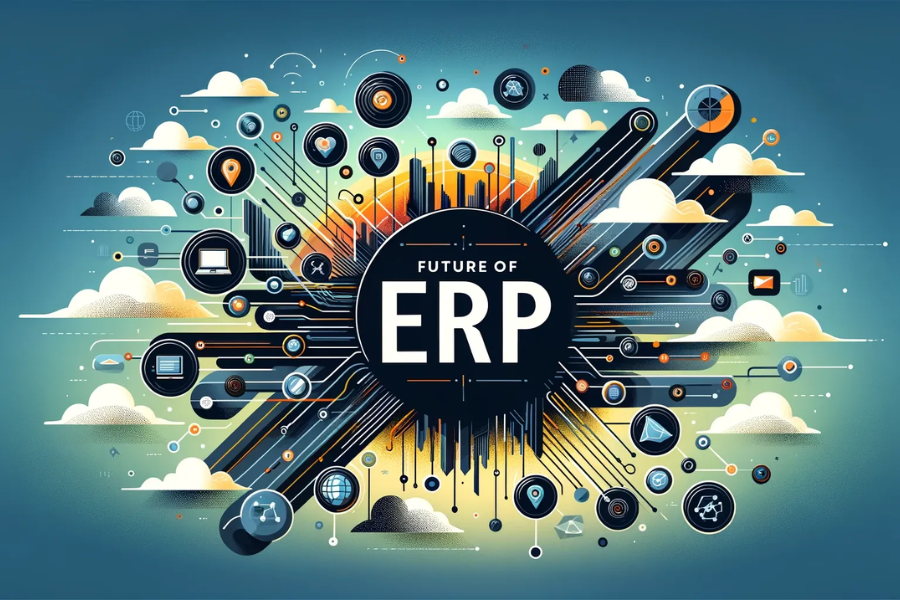Key Takeaways
- Understand the latest trends in ERP systems
- Discover how cloud-based solutions are revolutionizing ERP
- Learn the impact of AI and machine learning on ERP functionalities
Table of Contents
- Introduction to ERP Trends
- The Shift to Cloud-Based ERP Solutions
- AI and Machine Learning in ERP
- Data Analytics and Predictive Insights
- Mobile ERP Applications
- ERP Integration with IoT
- Conclusion
Introduction to ERP Trends
Enterprise Resource Planning (ERP) systems are experiencing significant changes due to new technologies and business requirements. Current ERP trends demonstrate a shift towards cloud-based solutions, which provide more flexibility, scalability, and cost-effectiveness compared to traditional on-premises systems. Additionally, combining machine learning (ML) and artificial intelligence (AI) enhances predictive analytics and automates repetitive tasks, resulting in improved operational efficiency and more informed decision-making. The emergence of mobile ERP apps is also significant, as they allow real-time access to critical data and promote a more agile and responsive workforce. As companies strive for digital transformation, keeping abreast of ERP trends, including advancements in SAP ERP, is vital to maintain a competitive edge and to foster business growth.
The Shift to Cloud-Based ERP Solutions
Cloud-based ERP systems are gaining popularity because of their flexibility, scalability, and affordability. They improve operational efficiency by facilitating real-time data access, encouraging teamwork, and lowering IT maintenance costs. These solutions enable companies to incorporate new features and adapt quickly to market changes without disrupting operations. They lower capital expenditure and maintenance costs by reducing the need for extensive on-premise hardware. This financial flexibility allows businesses to allocate resources more effectively, seize growth opportunities, and drive innovation. Accessing ERP functionalities anywhere also improves remote work capabilities, ensuring business continuity even in unforeseen circumstances. Cloud-based ERP solutions significantly improve business operations management, providing organizations with the necessary tools to thrive in a rapidly evolving digital landscape.
AI and Machine Learning in ERP
Artificial Intelligence (AI) and Machine Learning (ML) are transforming Enterprise Resource Planning (ERP) systems by providing intelligent automation, predictive analytics, and personalized user experiences. AI can predict future trends and make informed decisions, while ML continually learns from data inputs, improving efficiency over time. This enables businesses to automate routine tasks, freeing human resources for more strategic activities. AI can also customize dashboards and reports based on user preferences, ensuring immediate access to necessary information. AI-driven chatbots and virtual assistants can manage customer support and queries, guaranteeing prompt solutions and excellent customer satisfaction. These AI and ML capabilities set new standards in ERP functionality, guiding businesses toward more intelligent and responsive operations.
Data Analytics and Predictive Insights
Modern ERP systems have advanced data analytics tools that provide predictive insights, enabling businesses to make data-driven decisions. These tools help forecast demand, identify market trends, and optimize resource allocation. Predictive analytics help businesses mitigate risks and seize opportunities, maintaining a competitive edge. For example, they can anticipate supply chain disruptions and adjust strategies accordingly, efficiently avoiding costly delays and meeting customer demands. The deep analytical capabilities of modern ERPs can also reveal hidden patterns and correlations in data, revealing new growth opportunities. For example, sales data analysis can reveal unrecognized demand for a product feature, prompting the development of new offerings. Through the identification of the most efficient channels and messaging to reach target audiences, these insights can help inform marketing plans.
Mobile ERP Applications
Employees may now access critical business tasks while on the move, thanks to the development of mobile ERP software, which was made possible by the emergence of mobile technology. These applications facilitate quick decision-making, improve productivity, and enhance field operations. Employees can perform tasks like inventory management, sales tracking, and customer support from smartphones or tablets, boosting productivity and employee satisfaction. Mobile access to ERP systems ensures critical business data is available anytime, anywhere, crucial for timely decision-making and effective management of business processes. This real-time access can enhance the efficiency of operations, such as supply chain management. Sales teams can capture customer orders and provide up-to-date information on product availability, improving customer service and sales efficiency. The adoption of mobile ERPs reflects the growing importance of mobility in the business world and supports the trend towards more dynamic and flexible operating models.
ERP Integration with IoT
Thanks to the Internet of Things (IoT) interaction with enterprise resource planning (ERP) systems, industrial processes may be monitored and controlled in real time. This integration helps track assets, manage inventory, and optimize processes for better efficiency. Sensors embedded in equipment can send data to the ERP system, alerting maintenance teams of potential issues before they cause disruptions. This proactive maintenance approach saves companies time and money by predicting equipment failures and scheduling maintenance in advance. IoT integration also provides a comprehensive view of business operations, aiding in better decision-making and strategic planning. For instance, IoT data from manufacturing equipment can be linked with ERP data on workforce availability, ensuring optimal scheduling and resource allocation. Real-time inventory tracking can prevent stockouts and overstock situations, improving supply chain efficiency.
Conclusion
AI, IoT, and cloud computing, among other technological innovations, are shaping future developments for ERP systems. By utilizing these advancements, businesses may increase decision-making, expedite processes, and maintain their competitiveness in a constantly changing market.
To fully utilize new technologies, businesses need to be aware and flexible with their ERP strategy as these trends grow. Purchasing cutting-edge ERP systems that take advantage of these developments will boost operational effectiveness and put companies in a successful long-term position in a world that is becoming increasingly digital. ERP systems’ ongoing development is expected to open up even more possibilities for innovation and enhancement, pushing companies’ productivity and efficacy to all-time highs.
Keep an eye for more news & updates on TimesAnalysis.Com!



